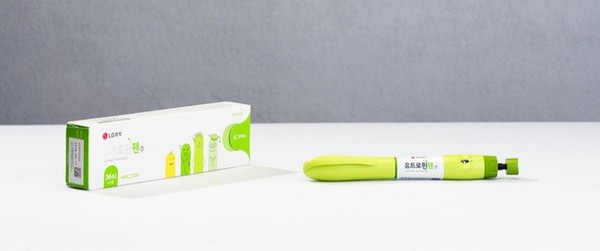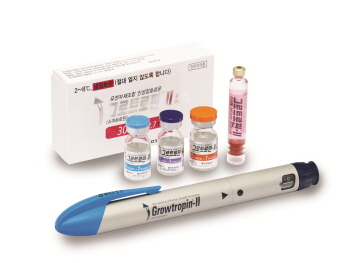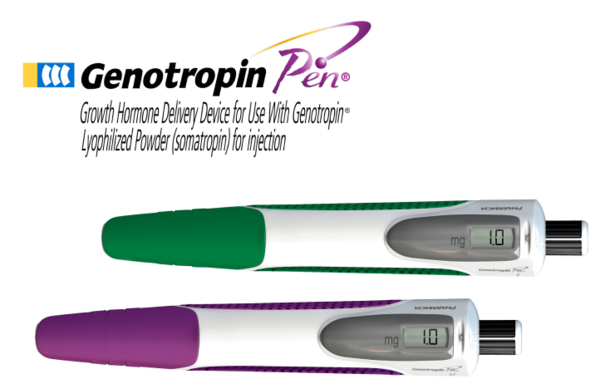In recent years, Korea's market for pediatric growth hormone treatments has witnessed a significant surge, with non-reimbursable treatments accounting for 90 percent of the total prescriptions.
According to IQVIA, a drug market research firm, the pediatric growth hormone treatment market grew to 238.6 billion won in 2022 from 145.7 billion won ($109 million) in 2019.
The market has continued to grow last year, with the market recording sales of 130 billion won in the first half of last year, with projections indicating that the market size could exceed 250 billion won for the entirety of 2023.

Leading the market is LG Chem, which has solidified its position by replacing its original Eutropin with the next-generation Eutropin Plus.
Since the introduction of Eutropin in 1993, LG Chem has demonstrated consistent growth.
Eutropin dominated the market with a 44 percent share in the first half of last year, achieving over 1 billion won in sales in 2021, and an estimated 1.2 billion won in 2022, with projections of reaching 1.4 billion won in 2023.
The approval of Eutropin S last April, with an extended shelf life from 18 to 24 months, marks a significant improvement in supply stability and patient convenience, according to LG Chem.
Eutropin S has seen rising sales from 55 billion won in the fourth quarter of 2022 to 193 billion won in the first quarter of 2023, indicating a successful generational transition from the original Eutropin, which has seen declining sales.
LG Chem has invested over 30 billion won in the production process to ensure a stable supply of Eutropin S, emphasizing the importance of patient convenience and exploring expansion plans linked to growth hormone products.
Following closely are Dong-A ST and Pfizer, with Dong-A ST's Growtropin II and Pfizer's Genotropin series rapidly gaining market share.

Dong-A ST's Growtropin, developed in 1995 using recombinant DNA technology, has been continuously improved, such as changing the freeze-dried formulation to a liquid formulation and adding a pen-type formulation besides the vial type, resulting in it taking the second place in sales following LG Chem's Eutropin.
Dong-A ST's Growtropin II recorded sales of 33.2 billion won in the first half of last year, a 57% increase compared to the first half of 2022. Since then, it has recorded sales of 69.8 billion won up to the third quarter of 2023, with sales of more than 90 billion won expected last year.
Pfizer's Genotropin series has seen an even larger increase in sales.

The combined sales of Genotropin and Genotropin GoQuick went from 14.1 billion won in the first half of 2022 to 26.3 billion won in the first half of last year, an 86 percent increase in one year.
Additionally, Pfizer plans to add a new product to its lineup with the approval for Ngenla (active ingredient: somatrogon) in September of last year. Ngenla highlights the convenience of once-weekly administration and the reduction of patient burden as its strengths.
The launch of Ngenla, which features once-weekly injections in domestic clinics and hospitals, is expected to change the prescription market, creating competition between daily and once-weekly injection treatments.
As a result, with Pfizer launching a new drug, competition between daily and once-weekly injection growth hormone treatments has started in the domestic market.
However, since Ngenla is not a non-reimbursable but an insurance-covered prescription, some industry watchers expect that Ngenla's growth in a market dominated by non-reimbursable treatments will be somewhat limited.
Regarding this, a pediatrician running a clinic in Gyeonggi Province said, "Growth hormone treatment is not easy because children have to receive injections daily, and there is a significant cost burden."
The once-weekly injection certainly has strengths, but it depends on the evaluation of patients and their parents, he added.
Related articles
- Adverse event reports of growth hormone injections on the rise
- Korean parents' height obsession: surging growth hormone demand raises financial, efficacy concerns
- Genexine-Handok’s long-acting growth hormone gets ODD status in developmental stage
- What are rare diseases that deter children's growth and their treatments?

